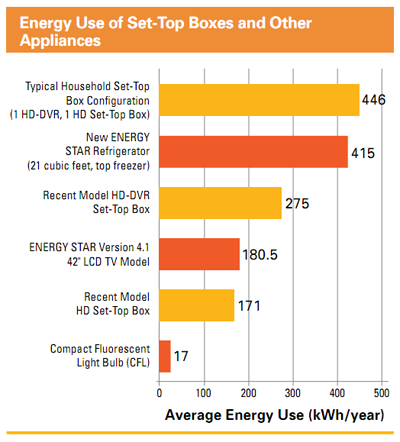Boxee fights to keep basic cable unencrypted
Last updated Feb 8, 2012 — 2065 views Boxee is battling with the U.S. cable industry over the right to keep “basic cable” transmissions unencrypted, so that third-party devices like the Boxee Box can be used in lieu of cable provider-supplied TV set-top-boxes (STBs). Boxee and other opponents of basic cable encryption assert that provider-supplied STBs generally are huge energy wasters, in contrast to more advanced gadgets like the Boxee Box.
Boxee is battling with the U.S. cable industry over the right to keep “basic cable” transmissions unencrypted, so that third-party devices like the Boxee Box can be used in lieu of cable provider-supplied TV set-top-boxes (STBs). Boxee and other opponents of basic cable encryption assert that provider-supplied STBs generally are huge energy wasters, in contrast to more advanced gadgets like the Boxee Box.
In an email blast issued today, Boxee marketing executive Andrew Kippen writes…
Amidst declining cable TV subscription numbers, cable companies are lobbying the FCC to force every cable subscriber to rent cable boxes or cable cards even if they don’t want or need them now. Their main claim is environmental benefits, but Boxee believes the real agenda is getting more subscribers to rent boxes and limiting competition from devices such as Boxee with Live TV.
We gave the FCC Chairman and few of his staff a presentation last Wednesday on how this will affect Boxee and the industry, and we are going to post something about it on our blog.
Who’s effected?
- Potentially millions of consumers who pay for cable TV but not a set top box
- Institutions like hospitals and schools who do not have cable boxes attached to all TVs
- Innovators like Boxee who allow users with bad over the air reception to use basic cable to watch live broadcasts
The proposed plan has far-reaching affects on consumers, start-ups, and the environment that few are really discussing. You can find Boxee’s blog post on the issue here.
In 2009, Cablevision applied for an FCC waiver to Section 76.630(A), which requires that cable companies not encrypt the basic tier of cable TV. CableVision asserted that a grant of the requested waiver “will reduce costs, improve customer service, reduce fuel consumption and CO2 emissions, and have virtually no negative impact on customers.”
Since the waiver was eventually granted on Jan. 8th, 2010 in exchange for response data by the FCC, many other cable providers have come forward seeking this same waiver pressuring the FCC into releasing a Notice of Proposed Rulemaking on the subject, which has snuck under the radar of most press and consumers.
Resources
You can see a list of filings related to this NPRM here, including Boxee’s Original Filing, Second Filing, and Third Filing, the NCTA’s response to our original filing, the Allvid Alliance Filing, the Consumer Electronics Association filing, and the Public Knowledge filing. Additionally, Public Knowledge released this blog post on Monday.
Some statistics
- According to Nielsen the average household has ~3 TV sets.
- According to the National Cable & Telecommunications Association, the top 5 cable providers alone serve 73 million subscribers
- According to the Natural Resources Defense Council the average power usage of 2 HD set top boxes in the home is ~446 kWh/year of energy (see chart below). That’s more than a new fridge!
- Cable companies have not released the number of people who could be affected, but judging by the number of people who have purchased TV Tuner devices in the past several years along with the assumption that a sizable portion of consumers do not have a set top box for every TV in their house, we assume it to be millions of consumers.
- According to SEC filings 4 of the larger cable companies lost over 375,000 video subscribers in the 3rd quarter alone last year.
Energy use of set-top-boxes and other appliances
(chart source: Boxee)
The contents of this post were extracted from a Boxee email blast issued today, and are reproduced here with Boxee’s permission.
